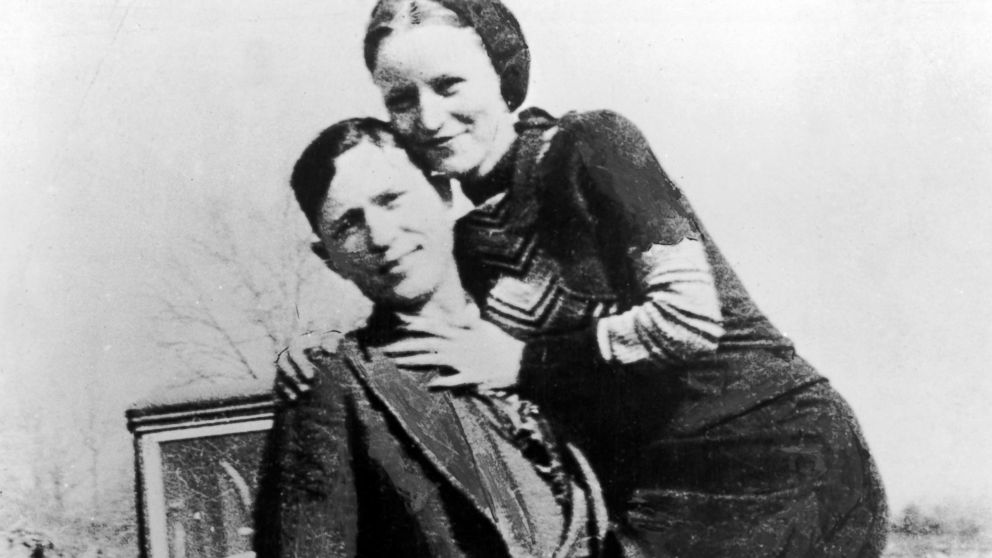Bank Robbery a Fading Vocation In Internet Age: A Look Back at the Greats
In the digital age, fewer criminals are robbing banks like Bonnie and Clyde.

March 27, 2014 -- intro: What's the career outlook for bank robbery? Not good, if you mean the classic hands-on heists perfected by "Pretty Boy" Floyd, John Dillinger, Baby Face Nelson or Bonnie and Clyde.
In the digital age, says the FBI, fewer and fewer guys (and dolls) are bursting into banks with tommy guns, yelling, "Reach!" and cleaning out the cash drawer. More often they are sitting at home in their pajamas, robbing banks online.
FBI statistics show that the overall number of hands-on bank jobs dropped almost 18 percent between 2010 and 2011, the last year for which data is available.
The most popular time for robbing banks is 9 a.m. to 11 a.m., according to FBI statistics, followed by 3 p.m. to 6pm. The preferred day for robbery is Friday.
Former special agent Jerry Clark, now an assistant professor of criminology at Pennsylvania's Gannon University, tells ABC News that Friday is popular because it's payday--when the most money is deposited. The average amount of loot taken per bank robbery has been holding steady for several years at about $4,000.
Clark describes the 1930s as the great age of holdups, where robbers could—and did—become folk heroes. Guys like Baby Face Nelson, he says, robbed banks because, when nobody else had money, banks did. Thanks to primitive bank security systems and short-handed rural law enforcement, a robber could ply his (or in the case of Bonnie Parker, her) trade for years without getting caught.
Likewise, says Clark, today's improvements in bank security and in law enforcement explain bank robbery's decline: Today, most robbers are quickly apprehended. Even the best are lucky to last a year. They're not around long enough to acquire nicknames, let alone become folk heroes.
Today if you bump off the bank in Yankton, South Dakota, the bank's camera transmits a high-resolution photo of you to every police department in the state. By the time you get to your next job in Vermillion, there's a welcoming committee waiting.
Among the most successful bank robberies of all time, Clark lists The Great Brinks Robbery of the 1950s ($2.7 million) and a 1978 wire transfer robbery that netted its perpetrator $10.2 million. If you factor in inflation, though, he says, a few ancient robberies were even more spectacular. He cites an 1831 heist in New York where the robber made off with what today would be $52 million.
Conventional bank robbery, Clark says, has gone from being a low-risk, high-reward proposition to just the opposite: Sentencing guidelines that went into effect in 1987 give judges leeway to impose longer sentences than in the past. Robbers who use a gun—or who just threaten violence—get still longer sentences. The corresponding penalties for cybercrime, says Clark, are less severe. Bumping off a bank online he calls low-risk, high-reward. And it's much harder to get caught, especially if you operate from off-shore.
Asked which bank robber might qualify as having been the most inept, Clark, who is working on a book due out in 2015 ("A History of Heists: Bank Robbery in the United States") thinks it would have to be the guy who used a deposit slip from his checkbook to write the demand note he then slipped a teller.
For a celebration (maybe the wrong word) of some of the most successful, famous and/or bank robbers of all time, continue.
quicklist: 1title: John Dillingercategory: media: 23066751text: Not content with robbing two dozen banks, Dillinger robbed four police stations as well. He and his gang unleashed a carnival of crime across the Midwest of the 1930s, eclipsing even such luminous contemporaries as Baby Face Nelson and Pretty Boy Floyd. He was shot to death by FBI agents in 1934 while leaving Chicago's Biograph Theater. In case anyone ever asks you, the picture that was showing was "Manhattan Melodrama."
quicklist: 2title: Nussbaum and Wilcoxsoncategory: media: 23066304text: Before they were locked away for life, the team of Albert Nussbaum and Bobby Wilcoxson robbed eight banks in the 1960s, accumulating a massive arsenal of weapons and setting off several bombs in Washington, D.C.
quicklist: 3title: Pretty Boy Floydcategory:media: 23066350text: Charles Arthur "Pretty Boy" Floyd was brought to justice by the FBI's Melvyn Purvis, the same special agent who ended the career of John Dillinger. Floyd robbed banks during the Depression and killed some 10 people. While running across a field in 1934 trying to escape federal agents, he was shot to death. Folk singer Woodie Guthrie later wrote a ballad celebrating Floyd as a Robin Hood who had "saved many a starving farmer" by tearing up mortgage notes from the banks he robbed.
quicklist: 4title: Patty Hearstcategory: media: 23066587text: Surely the most unlikely bank robber of modern times, Patty Hearst was the granddaughter of storied publishing magnate William Randolph Hearst. Kidnapped in 1974 by a group of Berkeley radicals known as the SLA (Symbionese Liberation Army), she was brainwashed, she said, into participating in the SLA's criminal activities, which included bank robbery. She eventually was captured by the FBI, tried by a jury, sentence to seven years in prison. She served two years before being pardoned by President Carter.
quicklist: 5title: Baby Face Nelsoncategory: media: 23066700text: Before being killed by FBI agents in a 1934 shoot out, Baby Face Nelson (born Lester M. Gillis) robbed a variety of banks, including the Merchants National Bank of South Bend, Ind. For a brief time, he was part of the John Dillinger gang and vacationed with Dillinger at the Little Bohemia Lodge in northern Wisconsin.






